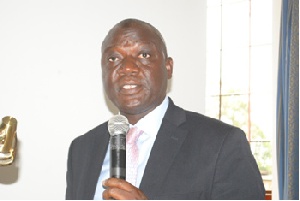Dr. Musheibu Mohammed Alfa, Deputy Upper West Regional Minister, says uncoordinated development, duplication of efforts and over concentration of activities on the part of development partners, non-governmental and civil society organisations, brings no benefits to the people.
He said in an attempt to provide development projects and services, some development partners, non-governmental and civil society organisations, had over the years come into conflict with one another over “who gets the credit and for what”.
That practice, he said, had brought about the wasteful use of scarce resources on what had been done by others resulting in a duplication of efforts and in some cases, government or district assemblies’ development agenda were ignored.
Dr. Alfa raised these concerns at the first-quarter interface meeting between the Regional Coordinating Council (RCC) and non-governmental and civil society organisations operating in the region on Thursday in Wa.
He said the RCC was aware those district assemblies and some community leadership may be apathetic in dealing with development partners, non-governmental and civil society organisations on issues of lack of openness and mistrust.
“When instances like these occur, your interventions suffer and the community members who are the beneficiaries become worse off, Dr. Alfa pointed out.
Dr. Alfa however said development partners, non-governmental and civil society organisations had played crucial roles in the development of the region, noting: “without them, the development situation in the region would have been worse”.
He said development partners had provided the districts with school buildings, health facilities, water and sanitation, and promoted the well-being of children, mothers and the disadvantaged in society.
They had also supported the districts with micro-financial resources; promoted the development of human resource skills and built the capacities of farmers in the communities to help complement government’s development efforts.
Madam Clara Dube, UNICEF Chief of Field Office- Tamale charged development partners, non-governmental and civil society organisations to be transparent and accountable and avoid waste of resources, since that limits their effort in the provision of more development interventions to the people.
They should ensure that their development plans and programmes dovetailed with those of the district assemblies and the Regional Development Strategy document, as well as all other development priorities of the region.
Mr. John Bosco Atogiba, Chief Director of the Regional Coordinating Council, said the region had development deficit in the areas of road infrastructure, health and education among others, and appealed to development partners to complement government’s efforts in the provision of those facilities.
The RCC initiated those regular interface meetings to meet twice in a year with its development partners to create a common platform to discuss strategies for enhancing the RCC’s capacity for effective coordination, harmonization and monitoring and evaluation of development interventions.
Development Partners, nongovernmental and civil society organisations, district chief executives, district planning officers and heads of government departments and agencies attended the forum to discuss work plans and contributions of development partners to the region in 2015 as spelt out in the Regional Development Strategy to help move the development agenda of the region forward.
Regional News of Sunday, 19 April 2015
Source: GNA

















